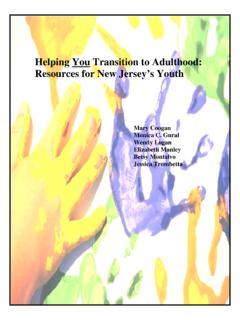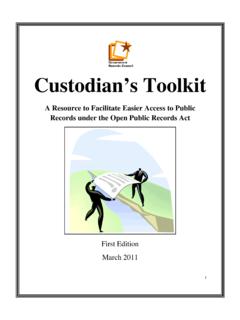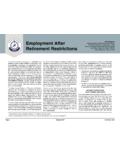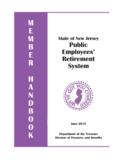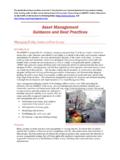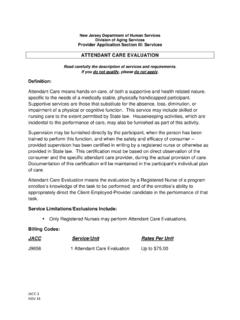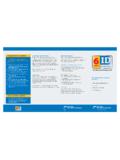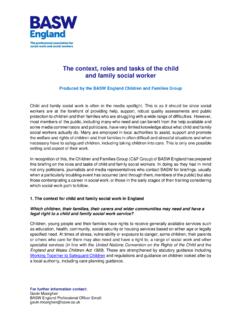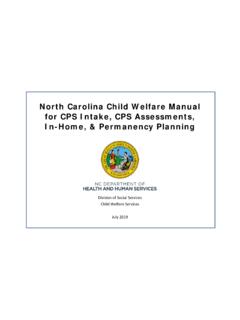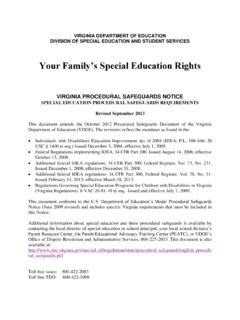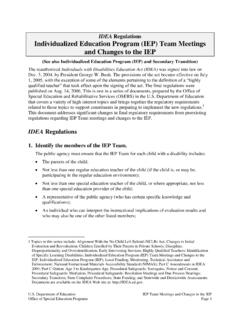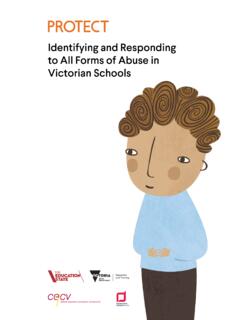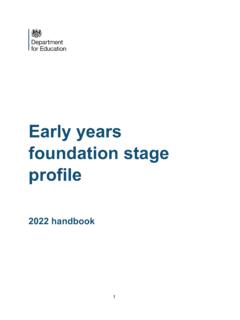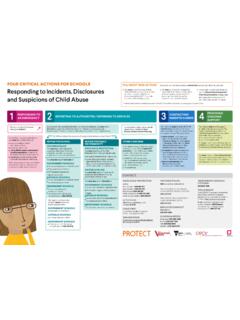Transcription of Special Education Process - Government of New Jersey
1 Special Education Process : From child -Find, Referral, Evaluation, and Eligibility To IEP Development, Annual Review and Reevaluation Companion Document to NJOSEP Code Trainings October/November 2006 Updated March 2007 Process to Determine Eligibility for Special Education and Related Services child -FIND child -FIND For preschool age students enrolled in early childhood FOR PRESCHOOL programs, the child -find obligations, including evaluation for eligibility for Special Education and related services shall be the responsibility of the district of residence of the parent of the student.[ (a)2i] child -FIND For nonpublic elementary or secondary school students, FOR NON- the child -find obligations shall be the responsibility of PUBLIC the district of attendance.
2 [ (a)2ii] PREREFERRAL INTERVENTIONS Interventions in the general Education setting shall IN GENERAL be provided to students exhibiting academic difficulties Education and shall be utilized, as appropriate, prior to referring a student for an evaluation of eligibility for Special Education and related services. [ (b)] Within Abbott districts, the system of assessment and interventions within general Education programs according to 6 shall be implemented for all students who have reading as their primary area of difficulty.[ (b)1] The staff of the general Education program shall maintain written documentation, including data setting forth the type of interventions utilized, the frequency and duration of each intervention, and the effectiveness of each intervention.
3 [ (c)] 2 REFERRAL Written request for initial evaluation submitted to the child study team When it is determined through analysis of relevant documentation and data concerning each intervention utilized that interventions in the general Education program have not adequately addressed the educational difficulties, and it is believed that the student may have a disability, the student shall be referred for an evaluation to determine eligibility for Special Education programs and services. [ (c)1] A direct referral to the child study team may be made when it can be documented that the nature of the student s educational problem(s) is such that evaluation to determine eligibility for Special Education services is warranted without delay.
4 [ (d)] Referrals may be submitted by instructional, administrative and other professional staff of the local school district, parents and state agencies, including the New Jersey Department of Education , concerned with the welfare of students. [ (a)3ii] TRANSITION FROM EARLY INTERVENTION TRANSITION FROM To facilitate the transition from early intervention to EI TO PRESCHOOL preschool, a child study team member of the district (e)1 board of Education shall participate in the preschool transition planning conference arranged by the designated service coordinator from the early intervention system . The district representative at the transition planning conference shall: Review the Part C Early Intervention system Individualized Family Service Plan; 3 Provide parents with written district registration requirements; Provide parents written information on available district programs for preschoolers, including options available for placement in general Education classrooms; and Provide the parent a form to utilize to request that the district board of Education invite the Part C service coordinator from the Early Intervention System to the initial IEP meeting for a child after a determination of eligibility.
5 IDENTIFICATION Deciding whether to evaluate: NOTICE OF A MEETING Parent (and adult student)1 is provided notice of a meeting to determine need for evaluation. The notice includes a copy of the procedural safeguards statement, Parental Rights in Special Education (PRISE). 1 Adult student means a person who has attained age 18, is not under legal guardianship and who is entitled to receive educational programs and services in accordance with federal or state law or regulation. For convenience, the term adult student is understood whenever the term parent is used. 4 MEETING Convened within 20 calendar days2 of receipt of written request by the district to determine whether an evaluation is warranted.
6 Meetings shall be scheduled at a mutually agreed upon time and place. If a mutually agreeable time and place cannot be determined, the parent(s) shall be provided the opportunity to participate in the meeting through alternative means, such as videoconferencing and conference calls. PARTICIPATION THROUGH ALTERNATIVE MEANS (k)4 PARTICIPANTS Parent (e); (e)3 child study team S 5 General Education teacher of the student who is S - 9 to 11 knowledgeable of the student s educational performance or if there is no teacher of the student, a teacher who is knowledgeable about the district s programs.
7 And Speech-language specialist when the student is preschool age or when the suspected disability is a language disorder REVIEW DATA Review existing evaluation data on the student (a)1 including evaluations and information provided by the parents, current classroom-based assessments and observations and observations of teachers and related services providers, and consider the need for any health S13 appraisal or specialized medical evaluation. 5 2 Excluding school holidays, but not summer vacation When an evaluation is not warranted: Determine other appropriate action. [ (e)] WRITTEN NOTICE Within 15 calendar days of the meeting, the parent S-4 provided with: Written notice of the determination that the evaluation is not warranted and: A copy of the short procedural safeguards statement; and Copies of the Special Education rules ( 6A:14) and the due Process hearing rules ( 1:6A) DISAGREEMENT The parent may disagree with the determination (h)3ii by requesting mediation or a due Process hearing.
8 When an evaluation is warranted: The student shall be considered identified as potentially a student with a disability. A case manager shall be assigned. 6 EVALUATION The screening ( , testing) of a student by a teacher or specialist to determine appropriate instructional strategies for curriculum implementation shall not be considered to be an evaluation for eligibility for Special Education and related services. [ (d)] Deciding the evaluation: PARTICIPANTS Parent (e) child study team S-5 General Education teacher S-9 to 11 Speech-language specialist as an additional member, when required DETERMINATIONS Nature and scope of the evaluation S-13, S-16 (a)3 Which child study team members and/or specialist(s)
9 Shall conduct each assessment that is part of the evaluation WRITTEN NOTICE Within 15 calendar days of the meeting, parent provided with: Written notice of the determination(s) and proposed action(s): The evaluation is warranted; The student is considered identified as potentially a student with a disability; The nature and scope of evaluation; A request for written consent from the parent. When the student is an adult student, consent is obtained from the adult student; A copy of the short procedural safeguards statement; and 7 Copies of the Special Education rules ( 6A:14) and the due Process hearing rules ( 1:6A) Parent must be given the opportunity to consider the proposed initial evaluation for up to 15 calendar days before providing consent.
10 The parent may provide consent sooner. OBTAINING CONSENT If the parent has not provided consent within 15 calendar days, and the district and parent have not agreed to other action, the district may request a due Process hearing according to (c). If the district chooses not to file for a due Process hearing to obtain consent for an initial evaluation, the district is not violation of its child find obligation or its obligation to evaluate the student. TIMELINES When consent for initial evaluation is granted, the evaluation shall be conducted without delay [ (d)].

